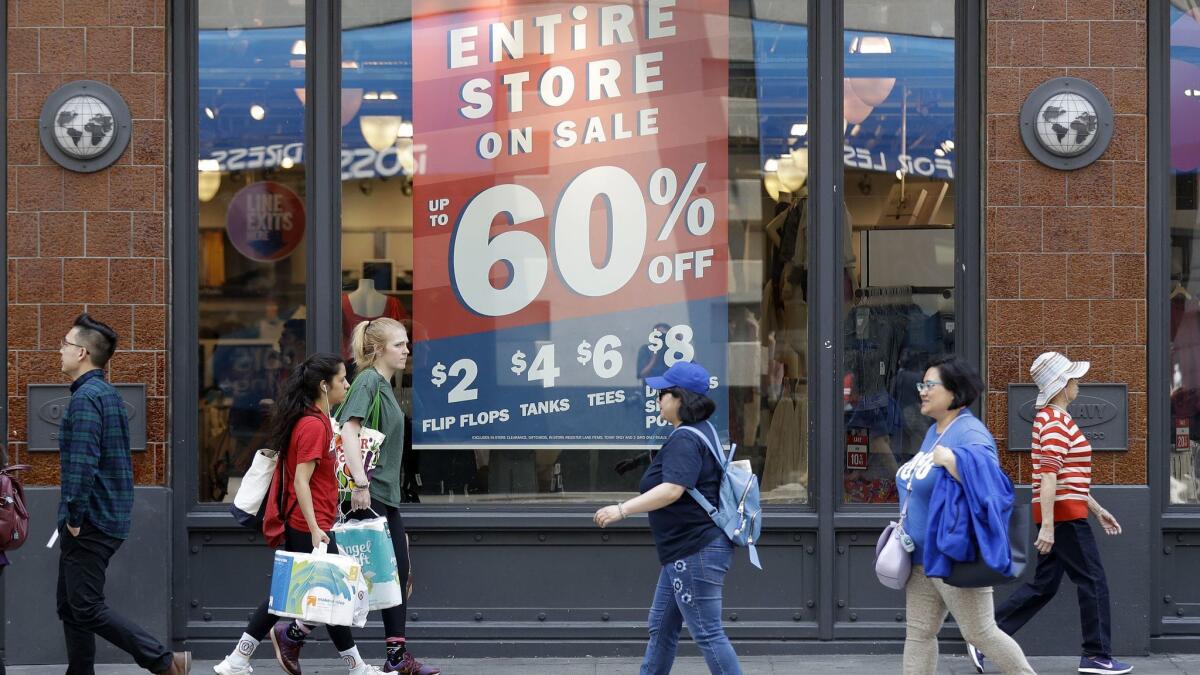Consumers shopped their way to higher U.S. retail sales than expected in July

- Share via
American shoppers stepped up their spending more than expected in July amid rising consumer confidence, a tight labor market and this year’s federal tax cut.
Higher spending on food, gasoline and clothing led a 0.5% jump in U.S. retail sales to $507.5 billion last month compared with June, the U.S. Commerce Department reported, a gain well above the 0.1% increase forecast by economists.
Although the agency also revised overall sales for June downward, to a 0.2% gain from the 0.5% jump originally reported, analysts said the July report bodes well for solid consumer spending during the back-to-school season now underway and the upcoming holiday season that’s crucial for retailers.
The gains last month “indicate that better job prospects, rising after-tax incomes, elevated levels of consumer confidence and increasing household net worth will provide a foundation for robust consumer spending over the next several months,” said James Bohnaker, associate director for U.S. economics at the research firm IHS Markit.
The tailwinds for retailers include a U.S. unemployment rate, at 3.9% in July, that’s near an 18-year low and economic growth overall. The tax cut also has provided extra dollars for discretionary spending, such as a meal out, home furnishings or extra apparel items.
The July spending report “adds to evidence that households are adjusting their spending behavior to reflect higher after-tax incomes,” economist Pooja Sriram of Barclays Research said in a note to clients.
Shoppers also are feeling confident enough to spend more even though they’re getting little relief from gasoline prices.
The average price of regular gas in California stands at $3.603 a gallon, up nearly 63 cents from $2.978 a gallon a year earlier, according to the American Automobile Assn.
Spending at the pump in July rose 0.8% from the prior month and was up a sharp 22.2% from a year earlier, the Commerce Department said.
Yet analysts noted that spending at bars and restaurants still jumped 1.3% from June and stood 9.7% above its level of a year earlier.
“Restaurants are a highly discretionary category, and continued strength suggests that households are not too worried about higher gas prices and that tax cuts are providing a cushion against higher expenses at the pump,” economists at Morgan Stanley & Co. said in a research note.
Bohnaker put it even more succinctly: “It is blatantly obvious that consumers are spending more of their tax savings and wage gains to go out to eat,” he said.
Retail sales are considered a bellwether of consumer spending, which accounts for two-thirds of U.S. economic activity.
Sales of clothing and accessories rose a stout 1.3% last month, while grocery stores saw a 0.8% increase.
Online sales overall in July rose 0.8% from June and were up 8.7% from a year earlier.
Home Depot Inc. on Tuesday signaled that home-improvement sales also were picking up, with the Atlanta-based company raising its sales and earnings targets for the full year.
Department store sales gained 1.2% compared with June, although Macy’s Inc. said Wednesday that its second-quarter sales slipped 1.1% from a year earlier to $5.57 billion, which contributed to a sharp drop in Macy’s stock price.
Macy’s has been closing, remodeling and changing many of its stores — some to include a discount section called Backstage — in hopes of reversing a years-long slump and positioning its sales for steady growth. Macy’s second-quarter sales at stores open at least one year, considered a key indicator of a retailer’s health, rose 0.5% from a year earlier, including sales from licensed departments in its stores.
The gain was tempered by a promotional event that shifted to the first quarter this year from the second last year. Excluding that shift, Macy’s same-store sales rose 2.9% in the latest quarter.
Retail sales overall were expected to pick up steam this summer, according to the National Retail Federation trade group.
The group said Tuesday that it had increased its retail sales forecast for all of 2018, to a gain of at least 4.5% rather than the 3.8% to 4.4% increase previously forecast. The group’s measure excludes sales at gas stations, at restaurants and of automobiles.
“Tax reform and economic stimulus have created jobs and put more money in consumers’ pockets, and retailers are seeing it in their bottom line,” NRF President Matthew Shay said in a statement.
But the group’s chief economist, Jack Kleinhenz, warned that heightened tariffs being levied by the United States and some key trading partners, which could lead to higher prices for certain goods, could damp consumers’ spending.
“Despite this upgrade in our forecast, uncertainty surrounding the trade war and higher-than-expected inflation due in part to increased oil prices could make consumers cautious during the fall season,” Kleinhenz said.
Times staff writer Samantha Masunaga contributed to this report.
UPDATES:
11:30 a.m.: This article was updated throughout with staff reporting and includes added details about the retail-sales report and analysts’ comments.
This article was originally published at 7:15 a.m.
More to Read
Inside the business of entertainment
The Wide Shot brings you news, analysis and insights on everything from streaming wars to production — and what it all means for the future.
You may occasionally receive promotional content from the Los Angeles Times.











